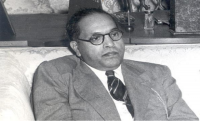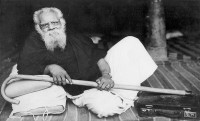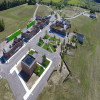Periyar's thoughts about villagers

The president of this association is an officer from the Education Department. The deputy tax collector, seated in the seat next to them, instructs the rural officials. Both officers have great responsibilities and powers to fulfill. As far as I'm concerned, all politicians consider me their archenemy. All the old people in the community, whom people hate and hate, are all against me. Not only that, the so-called upper classes, who are present in all the ruling centers in this country and control their activities, also oppose me. Besides, I was called an enemy of Sanatan tradition, culture and theology.
Although I would like to be a social reformer, my concept of social reform and the way they work is very different from others. I do not appreciate anything based on old religion, customs and traditions. Most of my reform methods, the working style, are based on a fragmentation of the styles and techniques established by tradition. To create anything new, it is necessary to destroy old and old beliefs, and my ideals of social reform focus primarily on this principle. This is why people make the mistake of viewing them as a dangerous and destructive person.
Under these circumstances, among the people here, the topic that I should make a statement on is the "Structural Plan for Rural Improvement and Rural Development". I do not know the extent of the accuracy and acceptability of my thoughts in the midst of this gracious presence. All I want to say is that while we all patiently absorb the amazing and comical humor in the dramas, you will also be interested in listening patiently to what I have to say. My prayer is that after you get home, try to remember again what I said here. Rethink it with an open heart, an absolute feeling, and an independent mind. A person can not witness the truth without serious thinking. It is impossible to make better decisions that are balanced between angry feelings.
Hurried decisions are not clever conclusions. Therefore, I ask you once again to seriously consider my results, and only then come to a logical conclusion.
friends! Now I have to start directly discussing rural reforms. By rural reform I mean all villages must be finished. Not only that, the word "village" should also be deleted from the dictionary. I would say that the word “village” should not find anywhere in politics either.
Today, the concept of a village is that its goals and surroundings are distinctly different from that of cities and towns. No matter what efforts you put into developing and reviving villages, you can never achieve your true goal, which is complete success. Some of these social reform programs for the advancement of untouchable cults such as "Paraya" and "Chikkalias" have proven to be new caste breeders such as "Harijan" or "Adi-Dravid". There must have been some minor changes as well, but they will not prove relevant to the rationale for rural development plans. Villagers can never enjoy the freedom and rights enjoyed by residents of cities and towns. This is because the purpose of establishing cities and towns is completely different from the purpose of establishing villages.
I would like to discuss it in detail. You find the community divided into different classes like Shudra, Kshatriya, Brahmin, Vaishya and Pancham according to Varnashrama principle. In it, you find the fifth (untouchables) at the bottom of the social stratification, the Varna system. Likewise, in the hierarchy of villages in cities and towns, you can see villages at the lowest level.
What is the Varnasrama Principle? In this system some people are considered higher and better than others. While some people are considered inferior and insignificant, they are criticized to the slightest. The highest people, called Brahmins, are happy and generous to live without shaking the body, without doing any work. They are not required to work. In spite of this, he was considered to be a controller of all kinds of comforts and comforts in his life. Whereas the second category, Dravidian species, must do endless work. Others benefit from their work. Varnashram is the basis of religion, that is, the caste system. Apart from that it is nothing else.
The first three varnas, which were created on the basis of the varna system, deliberately exploited the fourth and fifth varna in society due to this heinous, super-villain (caste system). It is believed that the members of the fourth and fifth classes were created for the happy and prosperous life of the upper three sects. It is also mentioned that the sects that come in the fourth and fifth furnaces, through the service of the three upper classes, can cross Vaitarni in the form of salvation and become the owners of Heaven. Apart from this, there is no other way to be saved (salvation).
Moreover, a rule was established that if the money reached the hands of members of the fourth and fifth furnace, then the upper class of Brahmin could wrest it by force.
It has also been argued that only persons of the first order, that is, Brahmin, have the right to read and write. People from Varna IV and V (Dravida) cannot read or write.
This is the basic principle of the Varna System, which you can see anywhere in cities, towns and villages. Please think about whether or not this is true.
Now we must think about what is a village? A village is a place where there is no school, hospital, theater, garden, police station, court, good roads, adequate lighting, and drinking water. So that there are no remains of a civilization. The villagers' income is limited to keeping the hungry beast outside the house. No way to win is necessary to a normal happy life. There is no opportunity to advance the mind, which is a natural human right. Rural and urban residents are completely deprived of the facilities that villagers have access to. Is there a need to know more about the situation in the villages?
However, cities and towns are said to be dependent on villages. People who live in cities and towns reap the benefits of rural employment. City dwellers and city dwellers enjoy every product of the village. In general, the wealthy who live in cities and towns are the real beneficiaries. Villages also contribute to the government in terms of tax collection. Even all the so-called gods and temples, along with those who depend on those temples and temples, enjoy the existence of the villages.
Look at the economic situation and the prosperity of those who own fertile and irrigated lands. Go to the village and see how they live while living there. Look at moneylenders and marawares in the area where the arid, fallow and fame lands are. See how the moneylender is dancing on the villagers there. Compare their lives with those of the farmers and workers who run the plow. Even those people who buy goods from villages and sell them by transporting them to towns and cities, they also lead a luxurious life. Only the farmer who lives in the villages with the help of farming is obligated to lead a backward and mess-free life. Why does this happen?
Because he is uneducated. He works hard and produces food. After harvesting he fills them in bags and sends them to towns and cities. He takes nothing but cheap and useless donations to his cottage. And he feeds his children by making them their mushrooms and their mushrooms, saying: "God gave them this much." He is still content with that life, by filling his children's stomachs with his bowl.
If you enable the villagers to read and write, they will start to understand many things and say-
We sweat and produce. But we just have to go through starch and a tepid stomach. On the other hand, those who do not work very hard, stuff everything. They enjoy life without work. What is the reason for our suffering? "
Once the villagers are educated, then they will know a lot about their terrible problems. This is why the villagers remain in the dark, without an education. Is not this a clear indication that the villagers were treated the same way as the “fifth” (untouchables) according to the Varna system.
Under these circumstances, talk of improving the countryside with the help of development plans is a major fraud. These people, who even today are considered superior and superior to others, are busy chanting the slogan of Gramodar out loud. Social reformers are advised to go to the villages.
Lawyers and businessmen visit villages on Sundays with the primary purpose of researching their clients, dependents, and clients. Go there and pick up a broom. Clean the surrounding area. They even sing hymns. They do religious work by filling the trash in the basket! Tales of the grandeur of Rama and Hanuman fill the ears of both illiterate and illiterate villagers. At the same time, he also owes the character of Lancapati Ravana.
Do you think that the development of the village is possible only through these activities?
Please seriously consider whether such simple activities can lead to the true uplift of the villagers

Manoj Bhiva
Manoj Bhiva is a dedicated writer who loves to write on any subject. Manoj Bhiva maintains a similar hold on politics, entertainment, health, abroad articles. Manoj Bhiva has total experience of 3 years in web and Social. Manoj Bhiva works as a writer in Wordict Post.
Congresswoman Alma Adams from North Carolina is found to have COVID-19
Posted on 15th Aug 2022

A 4.4 magnitude earthquake that struck Northern California only caused minor damage.
Posted on 14th Sep 2022








